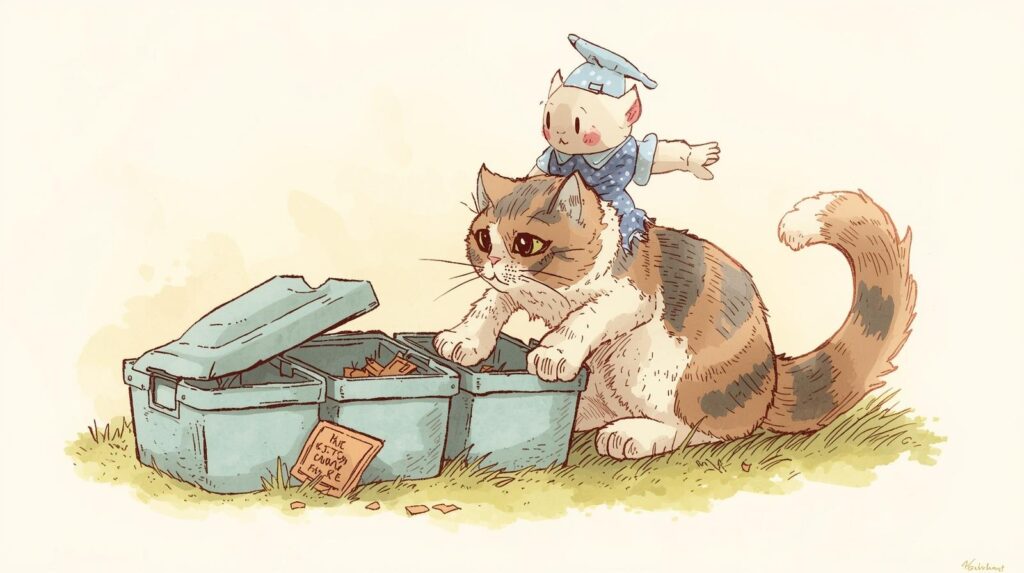
Litter training is one of the first steps to a happy life with your cat. It helps keep your home clean and makes life easier for both you and your furry friend. But what if your cat isn’t a kitten anymore? When is it too late to litter train a cat? The good news: it’s almost never too late!
Even senior cats can learn to use a litter box with a little patience and love. Whether you just adopted an older cat or want to help your pet after a big change, litter training is possible.
- Tip 1: Use a low-sided litter box for easy access.
- Tip 2: Keep the box clean and in a quiet spot.
- Tip 3: Never punish your cat—use treats and kind words instead.
Table of Contents
Can You Litter Train an Older Cat?

Yes, you can! Older cats are usually cats over 7 years old. Some might be slower to learn than kittens, but they can still succeed with the right setup.
Common Myths About Older Cats and Litter Training:
- “Old cats can’t learn new things.” Not true. Cats of all ages can learn with time.
- “They are too stuck in their ways.” Older cats can adjust with gentle care.
Behaviour Differences: Older vs. Younger Cats
Kittens are curious and quick to explore, which can make training easier. Older cats may be more cautious or have habits from past homes. But this doesn’t mean they can’t learn—they just need more patience.
When Is It Too Late to Litter Train a Cat?
Spoiler alert: It’s rarely too late! Most older cats can be trained unless they have serious health or mental issues.
When It Might Be Too Late:
- Severe medical problems like advanced dementia
- Unhealed trauma or fear from past experiences
- Extreme mobility issues with no solutions
But even in these cases, you can often work around the problem with help from your vet or a pet behaviour expert.
What “Too Late” Really Means
In most cases, “too late” just means more effort is needed. You might need to try new litter types, box styles, or training tricks. The key is staying patient and flexible.
Challenges of Litter Training Senior Cats
Training an older cat comes with a few extra hurdles. Here are the most common ones:
1. Physical Limitations
Older cats may have:
- Arthritis or joint pain
- Poor eyesight or hearing
- Trouble jumping or bending
Use litter boxes with low sides and place them where your cat doesn’t need to climb stairs.
2. Behavioural Resistance
Some cats are set in their ways. If they have never used a litter box before, they may resist change. Stay calm and keep routines steady.
3. Litter Box Access
Make sure the box is easy to reach:
- One on each floor of the house
- Away from loud machines or busy spots
- Not near food or water bowls
7 Expert Tips to Successfully Train an Older Cat
- Be Patient and Consistent
Repeat gentle training steps daily. Never yell or punish. - Choose the Right Litter Box
Look for wide, shallow boxes. Older cats need comfort and space. - Use Litter Attractants
Some sprays or litter types smell inviting to cats. Try these if your cat seems confused. - Feed at Regular Times
This helps you know when they might need to go. - Keep the Area Calm
Loud sounds or busy rooms may stress your cat. Quiet spaces are best. - Give Praise and Treats
Every time they use the box, give a gentle pet or snack. - See a Vet
Rule out pain, infections, or other issues if your cat resists training.
You may also like: accidentally inhaled cat litter dust
FAQs – When Is It Too Late To Litter Train a Cat?
1. Can you train a 10-year-old cat?
Yes! Many 10-year-old cats learn just fine with love and patience.
2. What if the cat has never used a litter box?
Start slow. Use dirt-like litter if they’re used to going outside.
3. How long will it take to train an older cat?
It can take days to weeks. Go at your cat’s pace.
4. Should I use covered or open boxes?
Open boxes are better for senior cats. They’re easier to get in and out of.
5. Does the cat breed affect training success?
Not really. Personality matters more than breed.
6. What litter is best for senior cats?
Soft, unscented litter is easiest on old paws.
7. Can medical issues stop litter training?
Yes, things like bladder infections or arthritis can make it hard. See a vet.
8. How do I clean up accidents without punishment?
Use pet-safe cleaners. Never yell or punish—it makes cats scared.
Conclusion: When Is It Too Late To Litter Train a Cat?
Training your cat to use a litter box may feel hard at first, especially if she’s older. But the good news is, it’s never too late. Your cat can learn at any age, if you show her love, give her time, and stay calm.
Here’s what to remember:
- Choose a good box and litter
- Place the box in a quiet spot
- Keep it clean every day
- Be patient and gentle
- Give praise or treats for good behaviour
Your cat wants to please you. She just needs your help to know how. With these simple steps, she will feel safe and learn what to do. So don’t give up — you’re both learning together!


